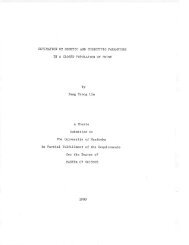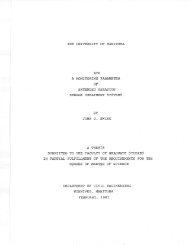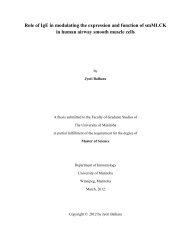Adverbial and Argument-Doubling Clauses in Cree - MSpace
Adverbial and Argument-Doubling Clauses in Cree - MSpace
Adverbial and Argument-Doubling Clauses in Cree - MSpace
You also want an ePaper? Increase the reach of your titles
YUMPU automatically turns print PDFs into web optimized ePapers that Google loves.
If an NP is <strong>in</strong> an adverbial clause, a determ<strong>in</strong>er with<strong>in</strong> it cannot be extracted.<br />
Sentences (66) <strong>and</strong> (67) show this, where the fiont<strong>in</strong>g of néwo 'four' <strong>in</strong> (66), <strong>and</strong> of mihz<br />
'those' <strong>in</strong> (67) results <strong>in</strong> ungrammaticai sentences.<br />
(66) a. càn sipwêhtêw ispî ê-mâci-nikanonit nêwo awâsisa.<br />
John Ieave- AI-3 when cj-beg<strong>in</strong>-s<strong>in</strong>g. AI-3' four child-3'<br />
'John lefi when four children began to s<strong>in</strong>g.'<br />
b. * nêwo c<strong>in</strong> sipwêhtêw ispî 6-mâci-nikamonit awâsisa.<br />
four John leave. AI-3 when cj-beg<strong>in</strong>-s<strong>in</strong>g.Al-3' child-3'<br />
(67) a. cîmiy pâhpiw ê-pihtokwênit anihi iskwêwa.<br />
Jimmy-3 laugh. Al-3 cj-enter. Ai -3' those woman-3'<br />
'Jimmy laughed when those women entered. '<br />
@SI<br />
b. * anibicîmiy pâhpiw ê-pîhtokwênit iskwêwa.<br />
those Jimmy -3 1augh.N-3 cj-enter.Al-3' woman-3'<br />
This exemplifies another difference between adverbial <strong>and</strong> argument-doubl<strong>in</strong>g<br />
clauses <strong>in</strong> <strong>Cree</strong>. While extraction is not possible <strong>in</strong> al1 argument-doubl<strong>in</strong>g clauses, its<br />
behaviour with respect to A-doubl<strong>in</strong>g versus adverbial is consistent with the analysis<br />
proposed here, that these clauses represent two types of subord<strong>in</strong>ate clause which can be<br />
compared to the two types of NPs found <strong>in</strong> <strong>Cree</strong>. Non-A-doubl<strong>in</strong>g constituents do not<br />
permit extraction, while A-doubl<strong>in</strong>g expressions (NP or clause) may, provid<strong>in</strong>g there are<br />
no other syntactic constra<strong>in</strong>ts, like Wh-isl<strong>and</strong>s, barr<strong>in</strong>g the construction.<br />
3.3.4. Conclusion<br />
In section 3 -3, then, we have exam<strong>in</strong>ed <strong>Cree</strong> pronom<strong>in</strong>al arguments, NPs <strong>and</strong> subord<strong>in</strong>ate<br />
clauses. I have argued that argument status is always assigned <strong>in</strong>side the verbal complex



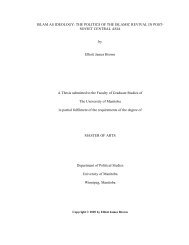
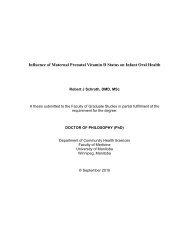
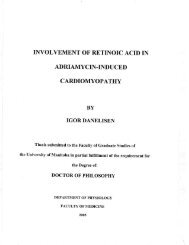
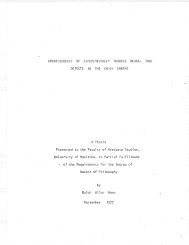
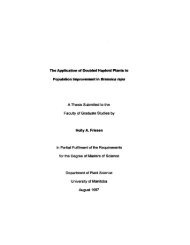
![an unusual bacterial isolate from in partial fulf]lment for the ... - MSpace](https://img.yumpu.com/21942008/1/190x245/an-unusual-bacterial-isolate-from-in-partial-fulflment-for-the-mspace.jpg?quality=85)
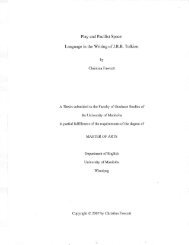
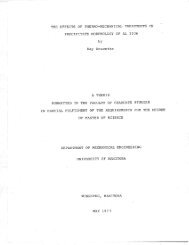
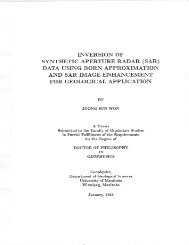
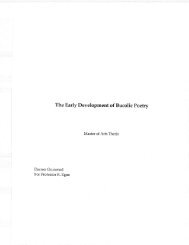
![in partial fulfil]ment of the - MSpace - University of Manitoba](https://img.yumpu.com/21941988/1/190x245/in-partial-fulfilment-of-the-mspace-university-of-manitoba.jpg?quality=85)
